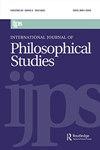调解以避免道德怀疑
IF 0.6
3区 哲学
0 PHILOSOPHY
INTERNATIONAL JOURNAL OF PHILOSOPHICAL STUDIES
Pub Date : 2023-05-27
DOI:10.1080/09672559.2023.2263708
引用次数: 0
摘要
对道德调和主义的一个普遍担忧是,它会导致我们对许多道德信仰的不确定性,最坏的情况是认识论上的道德怀疑主义。针对这种担忧,我认为道德调和主义将我们从认识论的道德怀疑主义中拯救出来,使我们能够对我们的许多道德信仰充满信心。首先,我表明,只有认真对待分歧,将其视为对我们信念的威胁,我们才能利用共识来支持我们的信念(称之为对称)。接下来,我认为利用道德协议作为一种认知资源,可以让道德调和主义抵制我们道德信仰信心潜在的令人担忧的下降。考虑到道德一致性的相关性,我认为反调和主义必须面对认识论道德怀疑主义的挑战。为此,我建议最好将道德探究理解为一种集体努力。如果是这样,那么我们需要在道德判断上达成一致,才能证明我们对许多道德信仰的信心是合理的。然而,通过对称,只有当一个人接受对分歧的和解态度时,这种呼吁才有可能。因此,接受而不是拒绝道德调和主义,才是摆脱道德怀疑主义的出路。本文章由计算机程序翻译,如有差异,请以英文原文为准。
Conciliating to Avoid Moral Scepticism
A common worry about moral conciliationism is that it entails at best uncertainty about many of our moral beliefs and at worst epistemological moral scepticism. Against this worry, I argue that moral conciliationism saves us from epistemological moral scepticism and enables us to be confident in many of our moral beliefs. First, I show that only taking disagreements seriously as a threat to our beliefs allows us to utilise agreements in support of our beliefs (call this symmetry). Next, I argue that utilising moral agreements as an epistemic resource allows moral conciliationism to resist the potentially worrisome reduction in confidence of our moral beliefs. Taking the relevance of moral agreement into account, I argue that it is anti-conciliationism that must meet the challenge of epistemological moral scepticism. For this, I suggest that moral inquiry is best understood as a collective endeavour. If so, then agreement on our moral judgments is required to justify the confidence we have in many of our moral beliefs. However, by symmetry, this appeal is possible only if one accepts the conciliatory attitude towards disagreements. Hence, accepting, rather than rejecting moral conciliationism, is the way out of moral scepticism.
求助全文
通过发布文献求助,成功后即可免费获取论文全文。
去求助
来源期刊

INTERNATIONAL JOURNAL OF PHILOSOPHICAL STUDIES
PHILOSOPHY-
CiteScore
0.90
自引率
0.00%
发文量
29
期刊介绍:
The International Journal of Philosophical Studies (IJPS) publishes academic articles of the highest quality from both analytic and continental traditions and provides a forum for publishing on a broader range of issues than is currently available in philosophical journals. IJPS also publishes annual special issues devoted to key thematic areas or to critical engagements with contemporary philosophers of note. Through its Discussion section, it provides a lively forum for exchange of ideas and encourages dialogue and mutual comprehension across all philosophical traditions. The journal also contains an extensive book review section, including occasional book symposia. It also provides Critical Notices which review major books or themes in depth.
 求助内容:
求助内容: 应助结果提醒方式:
应助结果提醒方式:


